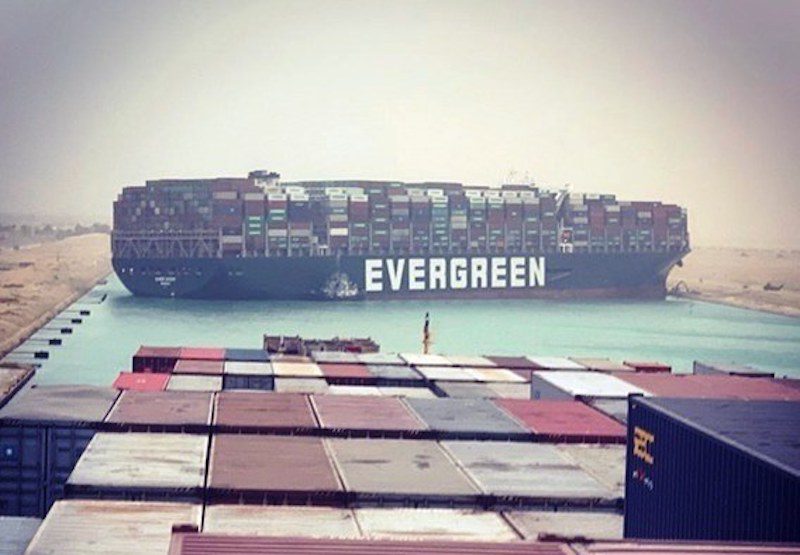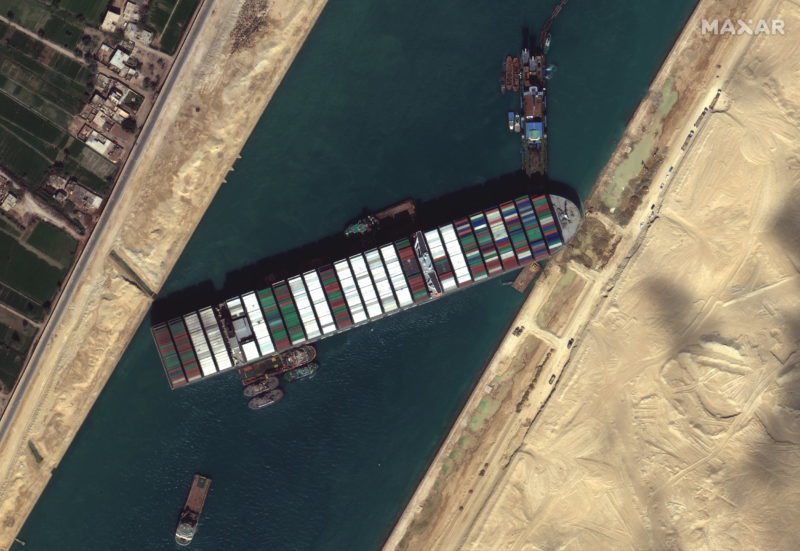Ever Given Report Highlights Suez Canal Pilots’ Role in Grounding
By
Mike Schuler | July 13, 2023
The March 2021 grounding of the
Ever Given marked a critical moment for the maritime shipping industry. Its grounding came near start of the pandemic-fueled boom cycle, thrusting the industry into the global spotlight as some 12% of global trade came to a screeching halt, not to mention launching what seemed like a internet million memes.
Now over two years later, the Panama Maritime Authority, acting as the authority of
Ever Given’s flag state, has submitted its
accident report to the International Maritime Organization, finally shedding light on the cause of what is arguably the most famous grounding in the modern shipping industry.
The Suez Canal is a 193-kilometer-long artificial waterway that connects the Mediterranean Sea to the Red Sea, providing a crucial shortcut for international maritime trade. It is owned and managed by the Suez Canal Authority, an Egyptian state-owned authority.
As for the
Ever Given, it is a massive containership that measures 400 meters in length and can carry up to 20,000 twenty-foot containers (TEUs).
Before its fateful voyage on March 23, 2021, the
Ever Given was anchored south of the canal, awaiting transit. Winds started to pick up, gusting to 35 knots at one point and causing the ship to drag anchor. To regain control, the captain raised the anchor and informed port control that the vessel intended to proceed to a safer location outside the Suez Canal waiting area anchorage. However, port control instructed the
Ever Given to hold position, as a convoy was starting and a pilot was on the way to the vessel, according to the report.
Around ninety minutes after the first pilot boarded, two additional Suez Canal pilots joined the crew and the
Ever Given began its northbound transit. It entered the Suez Canal without any issues, becoming the fifth ship in the convoy. However, as the Suez Canal Authority (SCA) pilots changed over, wind speed increased and visibility reduced due to blowing sand.
The two pilots had difficulty keeping the ship centered in the channel, and they ordered increased speed to aid in steering. However, the ship began turning to starboard. Despite efforts to correct the course, the
Ever Given continued turning and eventually ran aground on the eastern bank of the canal. The ship was firmly wedged across the waterway, with its bow and stern stuck in the canal banks. Initially, the Suez Canal Authority attempted to refloat the vessel using canal tugs and the now-famous digger to excavate the bow. However, these attempts were unsuccessful. The Suez Canal was blocked.
As the backup swelled to more than 400 ships, a frantic effort was launched to refloat the ship. The Suez Canal remained blocked for six days until it was freed on March 29, 2021.
The report found a combination of factors contributed to the grounding.
First, the VTMS (Vessel Traffic Management System), SCA pilots, and the ship’s captain failed to adequately assess the risk of bad weather conditions, including strong winds and reduced visibility. The ship did not take preventive measures for these conditions, including requesting tugboat assistance or postponing the transit. The non-use of tugboats in the restricted area was cited as contributing to the incident.
The report was highly critical of navigation decisions made by the SCA pilots. According to the report, they did not take bad weather conditions into account, gave improper instructions to the helmsman, and did not communicate effectively with the bridge team due to language difficulties. The vessel was also traveling faster than the maximum speed, which the report noted is common.
According to the report, the pilot did not give the helmsman a course to steer, only helm orders, i.e. hard to port or hard to starboard, with only limited midship or helm orders in between. “As per Master statement on at least two occasions, when the vessel was turning very quickly due to these hard over helm orders, Master intervened to order to rudder amidships to reduce the rate of the vessel turning towards one of other the canal banks,” the report says.
The report emphasizes the importance of careful pilot management and integration with the bridge team to reduce risks, and highlights the ineffective communication between the
Ever Given’s bridge team and the pilots. The investigation found discussions between the pilots in Arabic hindered the rest of the bridge team’s understanding of the pilot’s concerns and potential hazards.
Addressing the language barrier, the report states: “Language difficulties can also add to problems associated with pilots and these should be considered. In the case of M/V EVER GIVEN, although Pilots orders were given in English language, the discussion between them was always in Arabic language, therefore the Bridge Team, could not understand pilots concerns (if any), the potential hazards, in order to on time and effectively conduct risk assessment.”
The ship was also traveling at a speed of 12-13 knots, which exceeds the maximum permissible speed of 8.64 knots for ships in the Suez Canal.
The report was also critical of some of the captain’s actions. According to Suez Canal regulations, the captain has ultimate command of the ship, while the pilots fulfill only an advisory role and do not give orders unless authorized by the captain, who is familiar with maneuvering characteristics of the vessel. However, in this case, the captain was not actively involved in piloting the ship, although he did intervene at some points during the transit.
“The Captain, as the general responsible for the safety of the Ship, had to take command of the ship when the navigation was out of control, however, the control of the orders was always in charge of the pilots,” the report says, noting that the presence of two pilots rather than one may have convinced the captain that they had better control over situation. Ultimately, the investigation found that the captain’s interventions and instructions to the helmsman were ineffective in preventing the grounding.
“It has to be highlighted, that the Master and Bridge Team remain responsible for the handling of the vessel, with the Master giving orders to the helm and the engines. If the Master allows to the Pilot to give orders directly (this was the case on M/V EVER GIVEN), these orders are still considered as been carried out under the Master’s sole responsibility,” the report states.
Finally, the effects of squat (reduction in ship’s draft due to confined water) and bank (interaction between the ship’s hull and the canal bank) contributed to the loss of maneuverability and grounding. “The squat & bank effect, the speed and the changes in the direction of the wind and the hard helm orders directly influenced the loss of maneuverability of the ship,” the report says.
The Panama Maritime Authority made several recommendations, including crew training, clear communication during pilotage, evaluating the pilot’s actions, and paying attention during transit.
The report also recommends additional internal auditing for operators and managers, specific training courses for transit in the Suez Canal, and training campaigns for the bridge team. The Suez Canal Authority is advised to review its procedures and regulations, train pilots to maneuver larger vessels, impose English as the working language, and implement a system of alerts and contingency plan procedures.
The grounding of the
Ever Given had significant impacts on global trade and brought attention to the maritime shipping industry. With the accident report finally shedding light on the various factors that contributed to the grounding and recommendations to reduce the risk of future incidents, it remains to be seen how the industry will respond and what changes will be made to prevent similar accidents from happening in the future.
The March 2021 grounding of the Ever Given marked a critical moment for the maritime shipping industry. Its grounding came near start of the pandemic-fueled boom cycle, thrusting the industry...

gcaptain.com



